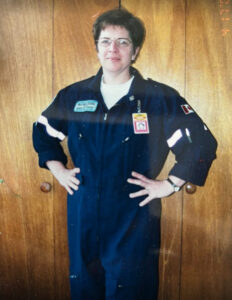Before June 2021, Heather was her usual happy, loving, organized and capable self. Like any other couple, even in retirement, we led busy lives. Before retirement, Heather enjoyed a full and rewarding career as a Respiratory Therapist at the local children’s hospital.

Retiring early at 56 was a privilege, affording us time for hobbies and fulfilling days still parenting our adult children to some degree, enjoying our little cottage, camping trips in a teardrop trailer, cycling, swimming at the YMCA, and on and on.
I always considered the house Heather’s domain, while the garage was mine. Whenever she gestured for a new shelf or requested furniture rearrangement, I eagerly complied and I sure loved my role as my sweetie’s #1 support staff. Our home remained clean and organized, with shelves of knickknacks and cabinets filled with items beyond my comprehension (more on that later).
However, in June, things began to change. Keys vanished from her purse or were misplaced in plain sight, like on the car hood during a park walk with the dog. Individually, these incidents weren’t alarming, but her inability to handle them independently and her emotionally upset response troubled me. Additionally, Heather lost interest in managing household finances after 45 years. Alongside memory lapses, her personality underwent subtle shifts—nothing negative, but for example, her apathetic reaction to her mother’s passing a few months later raised a red flag – I recognized this as a personality change.
Another lingering concern revolved around Heather’s minor facelift in June 2021, coinciding with the onset of these changes. I’ve pondered whether this procedure accelerated existing dementia. Although I raised this with her doctor and the Gerontologist who conducted her assessment and diagnosis, they assured me that a CT scan in October 2021 revealed significant brain atrophy predating any recent injury. Despite this reassurance, the thought still lingers, but I try to put it aside. Looking back doesn’t help us today.
As these deficits accumulated, I kept my growing apprehension to myself until our daughter’s wedding when she remarked, “Is mom okay? Has she given up or something?” Her observation marked the beginning of my candid discussions about my concerns regarding dementia.
That paints a brief picture of the very first signs of an issue and explains how ordinary and smooth our life was. In my next entry, I’ll list the deficits and challenges we have today, to show how far things have gone in under three years. My goal is to bring this blog up to the current time so that I can update you as things progress in the coming months and years.
It all seems so very compressed and rapid, which is common with FTD presentations, especially in younger people.
